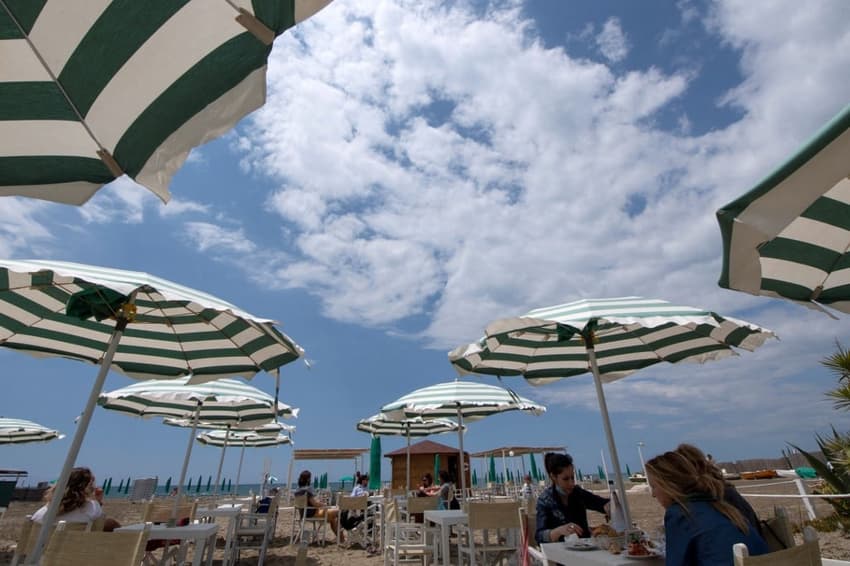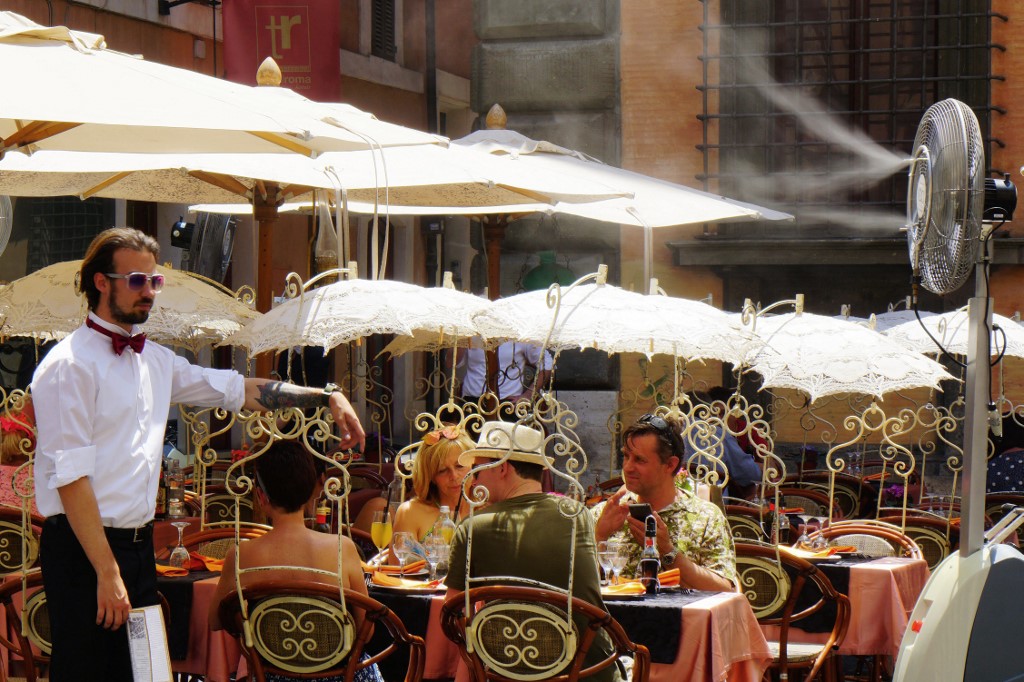OPINION: Why Italy can't fill its summer tourism jobs

Every year, Italian newspapers feature business owners' complaints that they can't fill thousands of summer job vacancies. Silvia Marchetti looks at why Italy has this perennial problem - and whether there's any solution.
Summer begins and each year it’s always the same problem: there’s a shortage of seasonal workers in the tourism industry.
Young people in particular don’t want to take up temporary jobs as hotel bartenders, waiters, cooks or beach lifeguards. Even if unemployed, they prefer to give up any potential temporary income. I’ve always asked myself how they could afford to.
READ ALSO: The jobs in Italy that are most in demand in 2023
Then again, who could blame them? Young summer workers often get paid €600 per month to work six days per week, sometimes even seven, without even one day off for three months in a row, throughout the whole of summer.
I once met a girl who had been working as an assistant to a hairdresser in Palermo for 100 euros per month, for six hours each weekday. When she told me I almost fell off my chair in shock.
I often happen to overhear teenagers chatting at the beach. The only job they want is a permanent 'posto fisso' contract with paid sickness leave and pension, they won’t accept anything else. Better to stay at home with mamma and nonna, under the family roof where everything - from food to bills - is paid for.
So to me it comes as no surprise that Italy has such a high unemployment rate for young people more broadly. We have the highest 'NEET' (not in employment, education, or training) figure in the European Union.
According to the latest data from Eurostat in May, the Italian NEET generation is composed of 17.7 percent of young men and 20.5 percent women, slightly higher for the latter.
Other than preferring to stay living at home as long as possible because it’s extremely convenient, there is another key factor at play.
READ ALSO: Why Italian resorts are struggling to fill summer jobs
The truth is, many Italians often turn down certain jobs considered ‘low’ in status, like plumbers, fruit pickers, stonemasons, gardeners, and cleaners.
A few years ago I heard on TV that even pizzaioli - the traditional, centuries-old job - were lacking and that Egyptian bakers, among others, were stepping in to fill the void. I visited pizzerias in Rome to see for myself and in front of the open oven there really were Pakistani and Indian pizza chefs who made a delicious, real, thick Neapolitan margherita.

Working through the summer in Rome. Many hospitality staff in Italy complain of low wages and long working hours. (Photo by VINCENZO PINTO / AFP)
I had a friend back in high school who refused to work as a hotel concierge in a cute little rural agriturismo because it entailed traveling around the region to participate in tourism meetings and promote the resort. It would have been a job to kill for, but he didn’t want to leave his very jealous girlfriend behind, or his mamma who loved cooking him two meals a day.
Changing the usual Italian mentality would be tough, but I think there should be more incentives for seasonal workers, such as stable contracts that run throughout the year and could potentially relocate them to places or sectors in need of staff, depending on the workload and season.
Young people dread that moment at the end of August when they’re told ‘ok, grazie e arrivederci’, and they’re back to square one having to look for another winter job.
OPINION:
- Why a ‘posto fisso’ work contract is still the Italian dream
- Italy's constant strikes are part of the country's DNA
Instead, hotel staff from the Costiera Romagnola could be sent to pick lemons or kiwis in Piedmont during the autumn, and then switch back to working along the coast when the high-season summer months start again. Italy’s powerful trade unions could play a key role in pushing through specific seasonal contracts.
Solutions have been discussed by political parties and institutions, but then failed to bear fruit in the form of a specific nationwide law.
At this time of year, Italian newspapers are packed with interviews with business owners and farmers complaining about a lack of bartenders and fruit pickers, but it’s all just background noise. Nothing happens to change things, it’s like playing a broken record.
Every July, at the beach south of Rome, I meet yet another new lifeguard who starts the season really excited about his ‘Baywatch’ gig - but by the time it's the end of August, he’s half-sleeping underneath the sun umbrella. When September comes, and his three-month contract is about to end, he can barely be bothered to whistle reckless swimmers out of the waves.
If he knew he had work lined up as an apple farmer up north, would he be any more enthusiastic? Maybe not.
Comments
See Also
Summer begins and each year it’s always the same problem: there’s a shortage of seasonal workers in the tourism industry.
Young people in particular don’t want to take up temporary jobs as hotel bartenders, waiters, cooks or beach lifeguards. Even if unemployed, they prefer to give up any potential temporary income. I’ve always asked myself how they could afford to.
READ ALSO: The jobs in Italy that are most in demand in 2023
Then again, who could blame them? Young summer workers often get paid €600 per month to work six days per week, sometimes even seven, without even one day off for three months in a row, throughout the whole of summer.
I once met a girl who had been working as an assistant to a hairdresser in Palermo for 100 euros per month, for six hours each weekday. When she told me I almost fell off my chair in shock.
I often happen to overhear teenagers chatting at the beach. The only job they want is a permanent 'posto fisso' contract with paid sickness leave and pension, they won’t accept anything else. Better to stay at home with mamma and nonna, under the family roof where everything - from food to bills - is paid for.
So to me it comes as no surprise that Italy has such a high unemployment rate for young people more broadly. We have the highest 'NEET' (not in employment, education, or training) figure in the European Union.
According to the latest data from Eurostat in May, the Italian NEET generation is composed of 17.7 percent of young men and 20.5 percent women, slightly higher for the latter.
Other than preferring to stay living at home as long as possible because it’s extremely convenient, there is another key factor at play.
READ ALSO: Why Italian resorts are struggling to fill summer jobs
The truth is, many Italians often turn down certain jobs considered ‘low’ in status, like plumbers, fruit pickers, stonemasons, gardeners, and cleaners.
A few years ago I heard on TV that even pizzaioli - the traditional, centuries-old job - were lacking and that Egyptian bakers, among others, were stepping in to fill the void. I visited pizzerias in Rome to see for myself and in front of the open oven there really were Pakistani and Indian pizza chefs who made a delicious, real, thick Neapolitan margherita.

I had a friend back in high school who refused to work as a hotel concierge in a cute little rural agriturismo because it entailed traveling around the region to participate in tourism meetings and promote the resort. It would have been a job to kill for, but he didn’t want to leave his very jealous girlfriend behind, or his mamma who loved cooking him two meals a day.
Changing the usual Italian mentality would be tough, but I think there should be more incentives for seasonal workers, such as stable contracts that run throughout the year and could potentially relocate them to places or sectors in need of staff, depending on the workload and season.
Young people dread that moment at the end of August when they’re told ‘ok, grazie e arrivederci’, and they’re back to square one having to look for another winter job.
OPINION:
- Why a ‘posto fisso’ work contract is still the Italian dream
- Italy's constant strikes are part of the country's DNA
Instead, hotel staff from the Costiera Romagnola could be sent to pick lemons or kiwis in Piedmont during the autumn, and then switch back to working along the coast when the high-season summer months start again. Italy’s powerful trade unions could play a key role in pushing through specific seasonal contracts.
Solutions have been discussed by political parties and institutions, but then failed to bear fruit in the form of a specific nationwide law.
At this time of year, Italian newspapers are packed with interviews with business owners and farmers complaining about a lack of bartenders and fruit pickers, but it’s all just background noise. Nothing happens to change things, it’s like playing a broken record.
Every July, at the beach south of Rome, I meet yet another new lifeguard who starts the season really excited about his ‘Baywatch’ gig - but by the time it's the end of August, he’s half-sleeping underneath the sun umbrella. When September comes, and his three-month contract is about to end, he can barely be bothered to whistle reckless swimmers out of the waves.
If he knew he had work lined up as an apple farmer up north, would he be any more enthusiastic? Maybe not.
Join the conversation in our comments section below. Share your own views and experience and if you have a question or suggestion for our journalists then email us at [email protected].
Please keep comments civil, constructive and on topic – and make sure to read our terms of use before getting involved.
Please log in here to leave a comment.